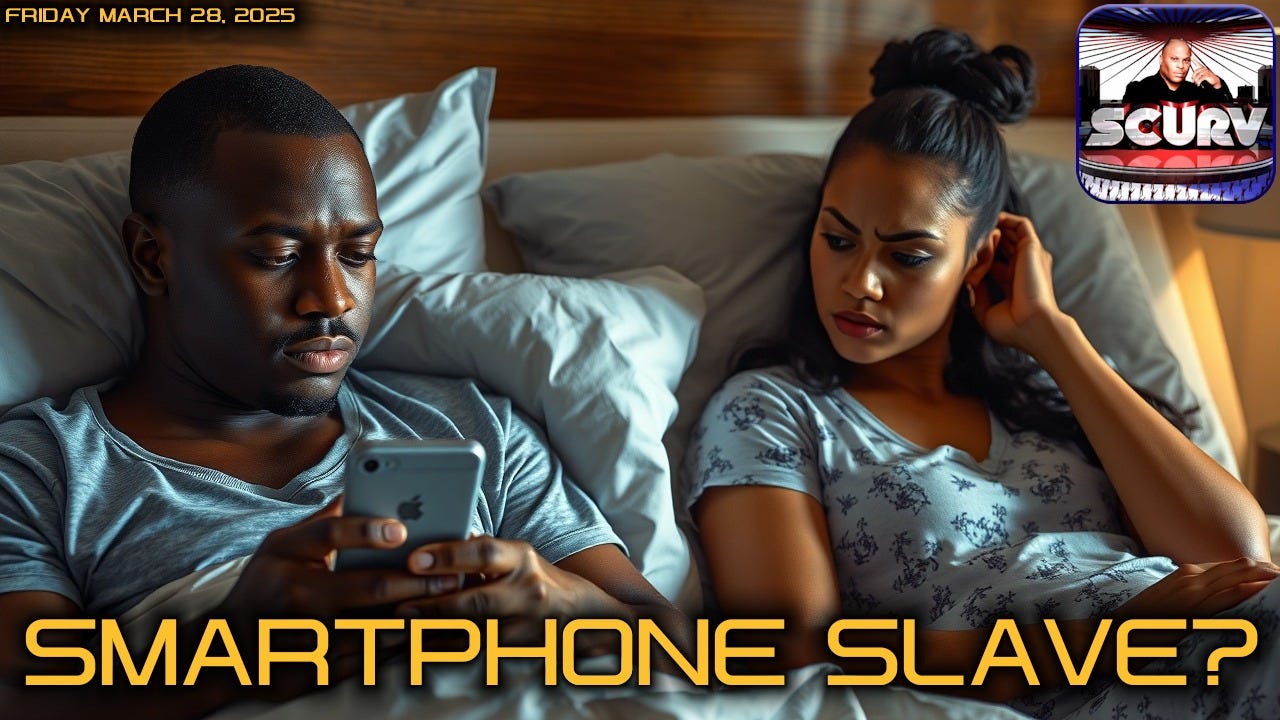THE DIGITAL ZOMBIE EPIDEMIC...
IS SMARTPHONE ADDICTION DESTROYING YOUR LIFE?
I never quite understood when older people would tell me how much better things were when they were growing up. As a child, I’d listen in confusion, wondering how they could possibly believe that when they didn’t have cordless phones, VCRs to watch movies at home, or even an answering machine to catch missed calls. They didn’t have the luxury of portable cassette players or car stereos—just a simple radio if they could afford it. Some of the elders I knew didn’t even grow up with a television in their home, and if they did, it was only black and white.
I remember visiting the homes of older folks who had these black-and-white TVs with a clear plastic sheet placed over the screen, supposedly turning it into color. But all I saw was a blurry green tint, and yet, they were excited about it. I thought it was foolish at the time, but looking back, that was just the way things were in their era. And now, as I approach the same ages they were back then, I find myself saying the same thing about my own time growing up—even in an age of so-called “advanced” technology.
Sure, the younger generation enjoys smartphones, high-speed internet, and an endless stream of entertainment at their fingertips, but I can’t help but feel that something crucial has been lost. The barbershop in Harlem where my father used to take me as a child in the late ’60s and ’70s was filled with men reminiscing about the past. They would speak about the excitement of gathering around the radio, hanging onto every word of a commentator describing a Joe Louis fight. Imagine that—feeling the intensity of a boxing match without ever seeing it, waiting until the next day’s newspaper for a few grainy pictures. Yet, despite their so-called technological limitations, they seemed to be more connected to the moment, to the experience, to each other.
Now, we have devices that allow us to see and hear everything in real-time, but somehow, we’ve become more disconnected than ever. The smartphone, ironically named, has dumbed us down. It doesn’t expand our minds; it stimulates us just enough to keep us hooked, feeding us dopamine hits with every notification, every like, every comment. But at what cost? It has robbed us of genuine human interaction, the kind that once brought us closer and gave life meaning.
And here’s the deeper question—if technology has stolen our ability to fully connect with one another, then who or what is benefiting from this stolen energy? Decades ago, a family could sit together at a dinner table, bonding over conversation with a radio playing in the background. Today, that same family might sit in the same room, each lost in their own phone, barely acknowledging one another. The warmth, the joy, the human presence—it’s all being drained. And I don’t believe that’s accidental.
Our life force, our very essence, is being siphoned. By what? By whom? That’s a discussion for another time. But understand this—our world feels different now because something is different. The empathy, love, and care that once flowed naturally between us have been stripped away. And what’s left? A society of disconnected, distracted, and depleted souls—digital zombies, caught in a trap they don’t even realize they’re in.
So let’s break it all down. How did we get here, and what is this addiction to smartphones really doing to us?
A Generation of Digital Slaves
We are living in an era where human beings are physically present but mentally absent. They walk the streets, their heads buried in their phones. They sit at dinner tables with family but never engage. They take vacations only to stay locked in their hotel rooms, scrolling endlessly. Their minds are hijacked, their purpose erased, their existence reduced to staring at a glowing screen with no real direction.
This is more than just a bad habit—it’s a full-blown mental sickness of the modern age. What started as a convenience has turned into an all-consuming addiction. Smartphones have become digital shackles, binding people to an artificial world while real life passes them by. These people are not just distracted—they are lost, zombified, completely disconnected from reality.
Some never even attempt to break free. They spend their retirement years reliving the past, digging through YouTube for old songs, ex-girlfriends, and nostalgic memories. Meanwhile, their present remains stagnant. Others don’t just trap themselves—they want to trap you too, forwarding hundreds of links a day, drowning your inbox with content they didn’t even take the time to watch.
From young adults to retirees, no one is safe. The digital prison has no walls, but its control is absolute. Relationships suffer, productivity disappears, and personal growth becomes nonexistent. This epidemic is not just shaping our world—it’s destroying it.
The Digital Prison: Trapped at Every Stage of Life
1. The Youth: A Lost Generation
Teenagers and young adults have never known a world without smartphones. Their childhoods were spent glued to screens, their social skills underdeveloped, their ability to focus nonexistent. They don’t dream, they don’t build, they don’t create. They scroll. Social media dictates their self-worth, and dopamine hits from likes and shares keep them addicted.
2. The Working Class: Distracted and Unproductive
Employees sit at their desks, mindlessly switching between tasks and social media. Meetings are ignored as notifications flood in. Even during their commute, they risk their lives, texting while driving. They have no deep focus, no real ambition—only an endless craving for digital stimulation.
3. The Retired: Living in the Past, Losing the Present
Many retirees, once full of wisdom and experience, now waste their golden years buried in their devices. They don’t travel, they don’t engage with family, they don’t explore new interests. Instead, they send endless links, talk about the past, and spend hours watching old TV shows and reminiscing about "the good old days" while their bodies deteriorate in isolation.
Relationships Destroyed by Digital Obsession
1. Marriages & Romantic Partnerships
Couples sit in the same bed but are worlds apart. One stares at their phone, the other longs for connection. Intimacy is replaced by notifications. Conversations are dry, attention is scarce, and relationships collapse under the weight of digital addiction.
2. Friendships Turned Into Spam Networks
Many so-called "friends" no longer engage in real conversations. Instead, they forward endless links, filling inboxes with videos, conspiracy theories, and useless content. They don’t even watch half of it themselves. They just want to tie up others in the same digital chains that hold them captive.
3. Parent-Child Disconnect
Parents give their toddlers iPads to "keep them busy." Meanwhile, their own eyes are locked on their screens. Family time is replaced by parallel scrolling sessions. The bond weakens. Kids grow up with detached parents, learning that human connection is secondary to digital consumption.
The Mental and Physical Toll: How This Addiction Destroys You
1. Mental Fog & Depression – The constant stimulation prevents deep thinking, creativity, and self-awareness. Many people feel empty but can’t pinpoint why.
2. Sleep Deprivation – The last thing they see before bed is their phone. The first thing they see when they wake up is their phone. Their sleep cycles are wrecked, their health deteriorates.
3. Physical Decline – Exercise is forgotten. They sit for hours, eyes strained, posture ruined, gaining weight, and losing vitality.
4. Anxiety & Restlessness – A phone-free moment feels unbearable. The addiction has rewired their brains to require constant input.
5. Lost Purpose – With no goals, no ambitions, and no drive, they exist in a state of mindless consumption.
Breaking Free: How to Reclaim Your Life
1. Set Boundaries – Turn your phone off during meals, before bed, and in social situations.
2. Delete Useless Apps – Social media, clickbait news, and entertainment apps keep you stuck. Remove them.
3. Reconnect with Real Life – Go outside, engage with family, read physical books, start a new hobby.
4. Stop Enabling Others – Don’t engage with people who flood your inbox with endless links. Break the cycle.
5. Seek Help if Necessary – If you can’t go an hour without checking your phone, it’s time to address the addiction seriously.
Fight Back or Stay a Slave
This is more than just a habit—it’s a crisis. A sickness. A digital pandemic. And it’s stealing lives in plain sight. People are no longer living—they are existing as mindless consumers of an artificial world.
It’s time to wake up. Cut the chains. Disconnect. Reclaim your time, your relationships, your mind, and your purpose. Or stay trapped, a digital zombie, forever watching, forever forwarding, but never truly living.
The choice is yours.
Smartphones Are Hijacking Our Minds and Destroying Our Lives
The smartphone is no longer just a tool—it has become a drug. Every notification, every message, every "like" or comment triggers a dopamine hit, the same chemical that fuels addiction to hard drugs. Social media companies, app developers, and tech giants know this. They have engineered their platforms to exploit our psychology, keeping us hooked, mindless, and submissive. We don’t just check our phones—we crave them. The addiction is so deep that we panic when we misplace them, feel anxious when the battery runs low, and experience withdrawal if we try to go without them. The digital world is not designed to help us—it is designed to own us.
This addiction has robbed us of real life. We don’t step outside to feel the sun on our skin. We don’t take deep breaths of fresh air. We barely interact with friends and family face-to-face anymore. A night out at a restaurant has turned into a group of people sitting together in silence, each lost in their own digital prison. Family dinners have become graveyards of conversation. Even in our most intimate moments, the smartphone lurks nearby, pulling attention away from human connection. Sex has been reduced to an afterthought, a moment interrupted by a vibrating phone on the nightstand.
It’s not just about distraction—it’s about destruction. How many car crashes have happened because of this addiction? How many lives have been lost because people couldn’t resist checking their phone for just one second while driving? How many relationships have collapsed because of endless scrolling, social media drama, and digital cheating? Dating apps have turned people into products, encouraging lustful, reactionary hookups that lead to unplanned pregnancies, broken homes, and the spread of diseases. People don’t fall in love anymore—they swipe. They don’t build deep connections—they chase fleeting validation.
And yet, we celebrate this addiction. People line up to buy the latest smartphone as if it’s an elevation of status, like some kind of life-changing achievement. But let’s call it what it really is: a new crack pipe. A fresh piece of drug paraphernalia designed to keep us high on distraction. The only difference is that instead of buying it from a street dealer, we proudly walk into a bright, welcoming store and hand over our hard-earned money to trillion-dollar corporations that profit off our enslavement. We are being played.
This is not just an addiction—it’s a war on our minds. And unless we wake up, unless we fight back, we will become a society of soulless, empty, disconnected husks, scrolling our lives away while the world burns around us. The choice is simple: take control of your mind, or let the machine own you. Which one will it be?





